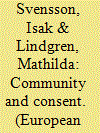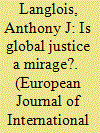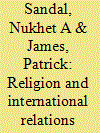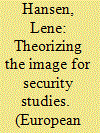|
|
|
Sort Order |
|
|
|
Items / Page
|
|
|
|
|
|
|
| Srl | Item |
| 1 |
ID:
103664


|
|
|
|
|
| Publication |
2011.
|
| Summary/Abstract |
This article addresses the question whether membership in the 'Anglosphere' - a grouping of English-speaking states/nations - impacts the likelihood of participation in US-led coalitions of the willing. I translate the Anglosphere into International Relations (IR) theory using a tripartite division of realism, liberalism and constructivism. In a quantitative empirical analysis of a sample of US-led military coalitions between 1950 and 2001, I find robust evidence of what can be seen as the Anglosphere effect: all else constant, English-speaking states/nations tend to be more willing to join US-led military coalitions than states/nations selected at random. I conclude with a discussion of future research avenues in the Anglosphere agenda in IR.
|
|
|
|
|
|
|
|
|
|
|
|
|
|
|
|
| 2 |
ID:
103669


|
|
|
|
|
| Publication |
2011.
|
| Summary/Abstract |
This study explores popular challenges against the state through nonviolent means. Although previous research has started to examine the effect of these 'unarmed insurrections', the relationship between challenging the state apparatus (vertical legitimacy) and the state identity (horizontal legitimacy) has not been adequately addressed. We argue that unarmed insurrections are most likely to be successful when challenging the vertical, rather than the horizontal, legitimacy of the state. Studying data for 287 years of protests in 57 non-democratic countries during the period of 1946-2006, we find support for three implications of this proposition: 1) campaigns that demand governmental regime change are more successful than campaigns for territorial changes; 2) success is less likely when the identity of the insurgents and the government is split along ethnic lines; and 3) success is less likely when society is highly polarized along ethnic lines rather than being ethnically homogeneous. Thus, when the community is divided, the efforts to withdraw consent will be less effective. The study discusses the implications of these findings for policymakers and scholars interested in nonviolent strategic action.
|
|
|
|
|
|
|
|
|
|
|
|
|
|
|
|
| 3 |
ID:
103670


|
|
|
|
|
| Publication |
2011.
|
| Summary/Abstract |
Students of bargaining have long focused on the dual nature of international negotiations, which take place both internationally and domestically. The prevailing wisdom is that under certain conditions political leaders can use domestic constraints to get a better deal at the negotiating table. In this article, I argue that under certain conditions leaders have an incentive to use 'international constraints' to pressure their domestic constituents into accepting a particular policy. I apply this argument to the Serbian and Croatian cases of Western pressure for cooperation with the International Criminal Tribunal for the former Yugoslavia (Hague Tribunal).
|
|
|
|
|
|
|
|
|
|
|
|
|
|
|
|
| 4 |
ID:
103671


|
|
|
|
|
| Publication |
2011.
|
| Summary/Abstract |
Chandran Kukathas has argued that 'the political pursuit of global justice is not a worthy goal, and that our aims in establishing international legal and political institutions should be more modest'. In this article I will examine Kukathas's argument, and argue in turn that he is mistaken to decry the efforts of those who press for global justice. Despite Kukathas's professed support for international law and cosmopolitanism, and his concern about global inequality and other injustices, he argues that we should forswear the use of political power and political reform to secure the former or address the latter. Instead, Kukathas points us towards the possibility of a future global convergence on moral standards, which, despite being belied by his focus on human diversity, he seems to view as a prerequisite for political activity towards global justice. Kukathas is mistaken in his arguments about the relationship between power and justice, and this leads him to false conclusions about the role that political reform and political institutions should play in consideration of global injustice.
|
|
|
|
|
|
|
|
|
|
|
|
|
|
|
|
| 5 |
ID:
103661


|
|
|
|
|
| Publication |
2011.
|
| Summary/Abstract |
Until the end of the Cold War, it is not an exaggeration to say that only a few theorists of International Relations (IR) or policy-makers engaged in either substantial investigation or articulation of the links between cultural variables like religion and ethnicity on one hand and international affairs on the other. In our article, we argue that this pattern does not do justice to the nature of mainstream IR theories. Although studies are accumulating, how (or whether) religion as a variable can be integrated into mainstream IR thinking still remains in question. We look at three main traditions in IR theory - classical realism, structural realism and neoliberalism - to see how religion can contribute to our understanding of international affairs within those frameworks. We claim that, without stretching the limits of theories or disturbing their intellectual coherence, possibilities for two-way interactions between the frameworks and identity-related variables like religion can be identified.
|
|
|
|
|
|
|
|
|
|
|
|
|
|
|
|
| 6 |
ID:
103666


|
|
|
|
|
| Publication |
2011.
|
| Summary/Abstract |
This article provides a framework for the study of visual securitization, that is, when images constitute something or someone as threatened and in need of immediate defense or when securitizing actors argue that images 'speak security'. To study security politics is to focus on the public constitution of threats and dangers; to study visual securitization, therefore, requires an analysis not just of the image as a free-standing entity, but of the ways it is constituted through spoken and written discourse. To analyze the process of visual securitization, this article advances an inter-visual/intertextual model consisting of four components: the visual itself, its immediate intertextual context, the wider policy discourse, and the constitutions of the image. Three additional sets of theoretical arguments deepen this model by pointing to the specificity of the image as comprised through immediacy, circulability, and ambiguity, the strategies of depiction that images employ, and the genres through which images are brought to the audience. The applicability of the theoretical framework is illustrated through a case study of one of the most conspicuous cases of visual securitization: the Muhammad Cartoon Crisis.
|
|
|
|
|
|
|
|
|
|
|
|
|
|
|
|
| 7 |
ID:
103668


|
|
|
|
|
| Publication |
2011.
|
| Summary/Abstract |
Noting that UN summits are the most auspicious venue for non-state actors to popularize worldwide issues of concern, writings on international relations have emphasized the rise of a global civil society and its growing ability to use these events for influencing transnational politics. Based on findings of empirical research from six developing countries that hosted UN summits or important preparatory meetings (PrepComs), we suggest that national settings remain fundamental for civil society activism. We examine the outcome of UN summits on civil society in three dimensions: creation of political space, implementation of the summit's agenda and alliance building. This study suggests that in each of these countries, the national processes of democratization and liberal economic reforms heavily influenced the outcome of these international conferences. In particular, the results reveal the paramount centrality of the state in the organization of the summit and in setting up parameters for civil society engagement during the follow-up process. While heterogeneity was an important trait of civil society, the UN bodies organizing the summits remained nearly absent in the post-summit period. A main conclusion emerging from the research is that, in addition to international connections, any major attempt on the part of civil society organizations (CSOs) to significantly participate in the political process, whether in the form of support or opposition, inescapably entails working with relation to the state in order to take advantage of the political opportunities available in the national context. Overall, the study results suggest that discussion on the rise of global civil society and international activism occurring in part thanks to UN summits needs to be supplemented by approaches that take into account national dynamics.
|
|
|
|
|
|
|
|
|
|
|
|
|
|
|
|
|
|
|
|
|